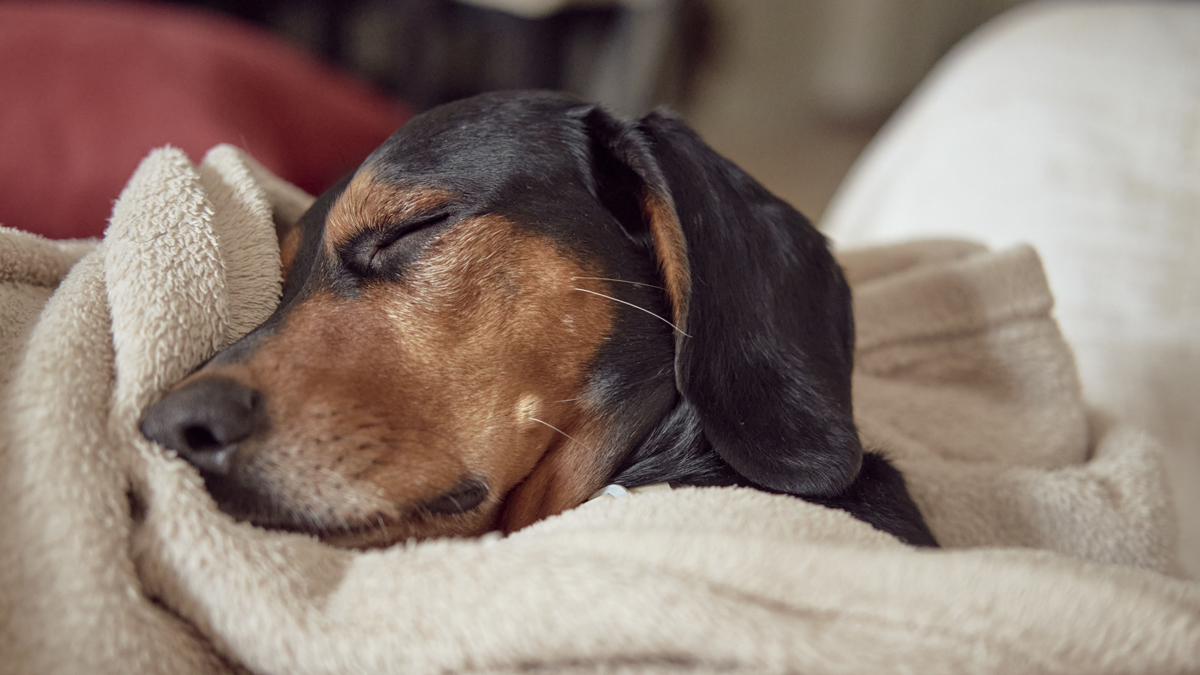
Your dog’s your best friend — or at least he is until he whines for your attention at 4 a.m., jolting you out of deep sleep. At that point, your dog feels a little less like your best friend and more like a restless newborn.
Much like humans, good sleep quality is imperative to your dog’s growth and overall well-being. Some dogs are early risers, but others might just have trouble sleeping through the night. If you suspect your dog falls under the latter category, don’t fret because there are ways to help your dog sleep through the night. But first, how much do dogs sleep on a daily basis?
On average, a dog sleeps for around 12 to 18 hours per day, making it harder for them to sleep as long as you do, especially if you tend to log in 8 or more hours in a night.
While there’s not much you can do to change the way your dog sleeps during the day, a calming dog bed, regular exercise, and a proper feeding schedule can all help your pup snooze better. Let’s take an in-depth look at some strategies to help your dog sleep soundly at night.
1. Exercise Your Dog
In the same way that exercise wears you out and improves your quality of sleep, physical activity can provide the same benefits for your dog.
All dogs have heaps of energy, and the best way to expend that is by playing with them or taking them on walks. Most dogs need around 2 hours of physical activity in a day, but the duration may vary depending on your dog’s breed and size.
The best time to exercise your dog for optimal sleep is right before bedtime. But if you’re short on time, take your dog on a long walk during the day to ensure they’re tired enough to sleep well at night.
2. Invest in a Comfortable Dog Bed
Think about what’s essential to you for a good night’s rest. The combination of a good mattress and a luxuriously soft pillow might spring to mind. Your dog needs the same.
The best dog bed should be cozy enough to help your dog fall and stay asleep. A memory foam dog bed is perfect in that regard because it can evenly distribute weight and is designed to provide pressure-relieving rest, making it the ideal place to unwind after a long day of play. A cool temperature can promote better rest and help your dog sleep, so opt for a cooling dog bed that won’t cause your pup to overheat during the night.
The right dog bed can do wonders to improve the quality of your dog’s sleep, so make sure to find one that cushions their body and head and provides sufficient support.
3. Create a Bedtime Routine
Dogs are creatures of habit, which is why establishing a regular bedtime routine can help your dog sleep better.
Try to feed your dog dinner at the same time, spend some time relaxing together, take your pup to the bathroom right before you go to bed, and train them to get into their dog bed when you dim the lights.
Your dog may not adjust to this schedule immediately, especially if they’re young, but with time, your dog will learn to recognize when it’s time for bed.
4. Establish a Feeding Schedule
A proper feeding schedule is as essential for a good night’s rest as a regular nighttime routine. If your dog eats right before bedtime, they won’t have enough time to digest the food, increasing the likelihood of waking up during the night.
Ideally, you should feed your dog when you’re getting ready to have dinner so you can both eat and go to bed at the same time. Be careful not to feed your dog any junk food, especially during dinnertime, because this could upset their stomach.
5. Get a Medical Check-Up
If you don’t see any changes to your dog’s sleeping habits despite following a healthy schedule for weeks, it may be worth taking your dog to a vet to get them checked for any underlying medical conditions.
This is especially important if your dog is older or if your dog’s sleeping habits changed unexpectedly. In the case of the latter scenario, the shift might not necessarily be serious. For instance, your dog might just be sleeping less because you moved to a new home, but getting medical advice can help you rule out other factors and put your mind at ease.
Once you determine the reason for your dog’s nighttime restlessness, you’ll be able to employ tactics to improve their sleep habits. Change won’t happen overnight, but consistency is key to helping your dog sleep better. A high-quality dog bed and a healthy sleep schedule can make a significant difference over time.




